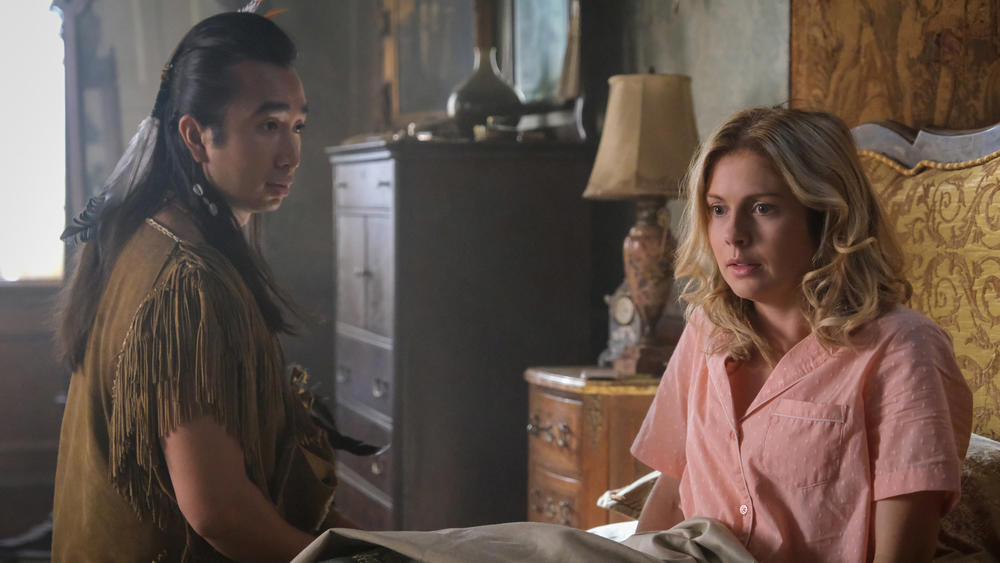Section Branding
Header Content
Network sitcoms are actually good again
Primary Content
Recently I took a look at my television diet and noticed something.
Quietly, without my clocking it, it had filled up with ... network sitcoms.
Network. Sitcoms.
Seriously: Half-hour situation comedies that originated from (checks notes, squints) "broadcast" television networks. Imagine! What year is this? The dream of the '90s is alive on my LG!
Abbott Elementary (ABC). American Auto (NBC). Grand Crew (NBC again). Ghosts (CBS). Pivoting (FOX).
This came as a legitimate, visceral shock, which I suppose is unfair and maybe even unkind, given that it came accompanied by this reflexive, unbidden, and just plain empirically wrong thought:
Network sitcoms? But I'm still young and hip!
I know, I know. Blame my brain. We tell ourselves stories in order to live ... with ourselves.
For a long time now, I've considered myself a cable-and-streaming guy. It's not a judgment, except in the very narrow sense that yeah okay it's maybe a little bit of a judgment fine shut up you made your point. I'd still dabble a bit, sure — Happy Endings, Parks and Recreation – but in my head, network TV was for families (read: primetime game shows) and formulas (read: cop shows, doctor shows, lawyer shows, military shows, firefighter shows). And that's just not what I'm looking for. Which is why I've mostly spent my evenings plumbing the darker, weirder depths of the cable grid, and navigating the frustratingly bad U.I.s of various streaming services like I'm some kind of Justin Long character trying to hack the mainframe.
And to be fair, it's not like I'm actually watching those five network sitcoms I mentioned above live, or anything. Heaven forfend. I mean, what am I, my mom?
No, I watch them time-shifted (an actual TV term that sounds just way more cool and cyberpunk than it turns out to be) later, on various streaming platforms. Sometimes that means I can watch them without commercials, sometimes they keep the commercials in so I have to mute them and just, like, sit there until they're over, the way the first pioneers used to get their Quinta Brunson content. (I'm sure there's a reason for the ad/no ad difference, but I don't understand it; ask my spouse.)
Why these networks sitcoms, and why now?
In Abbott Elementary's case, it was good old-fashioned word-of-mouth. In a pandemic that's deprived us all of the break-room watercooler, this ABC sitcom about an idealistic young teacher at a Philadelphia public school has enjoyed break-room-watercooler buzz, albeit virtually. It's got jokes, it's got heart (not too much!), and it's got a breakout character in Janelle James' Principal Ava Coleman, whom I would follow unto the end of earth.
And speaking of following folk, what first attracted me to three of the other shows I mentioned is my own pitched, helpless fandom for, respectively: Ana Gasteyer, who plays American Auto's ruthlessly ambitious and hilariously impulsive CEO; the fabulous Nicole Byer, who plays one of a group of friends hanging out at a Silver Lake wine bar on Grand Crew; and Pivoting's Eliza Coupe and Maggie Q, who are ... I mean they're Eliza Coupe and Maggie Q, for pity's sake. End of story. (OK, fine: Pivoting is about a group of women on Long Island who are getting over the death of a friend they had in common.)
As for Ghosts, it was the high-concept premise: A young couple inherits a mansion that's home to various spirits. When the woman has a near-death experience, she becomes able to see and talk to the ghosts, who come from very different backgrounds, and don't entirely get along. (Please don't slide into my DMs to assure me the original British version is better; I'll check it out eventually.)
Reasons like word-of-mouth, favorite actors and nerdy curiosity got me to check these shows out, but it's the writing that keeps me coming back, week after week. All five benefit from a gratifyingly rapid-fire joke-density, characters who are distinct and idiosyncratic without devolving to types, and actors who know when to double down on a punchline and when to toss it away.
And for all my snootiness about formulas, I'd be lying if I said I didn't find the familiar comedic rhythms of these sitcoms strangely comforting. All of them, it seems to me, have inherited a few strands of DNA from shows like Happy Endings and Parks and Rec. Watching the hangout shows (Grand Crew, Pivoting, and Ghosts, sorta) you can almost hear the banter-heavy beats of Happy Endings' dialogue playing just below every scene like an insistent bassline. The workplace comedies, meanwhile, take Parks and Rec's mockumentary approach and either dial it way up (Abbot Elementary) or use hand-held camerawork to make us feel like we're in the room whenever something goes horribly, horribly wrong (American Auto).
It's weird. The last time I found myself watching this many network television shows was in the '90s. I was working in bookstores, trying to make mock turtlenecks happen for me and dating women.
All those bookstores I used to work in have closed. Also I'm bald now, so mock turtlenecks just make me look like roll-on deodorant. So if the universe is trying to tell me something by making me love so many network sitcoms again, I'm going to have to schedule what promises to be a fraught and deeply concerning conversation with my husband.
If you liked this excerpt from NPR's Pop Culture Happy Hour, subscribe to our newsletter to get recommendations on what's making us happy every week.
Copyright 2022 NPR. To see more, visit https://www.npr.org.


